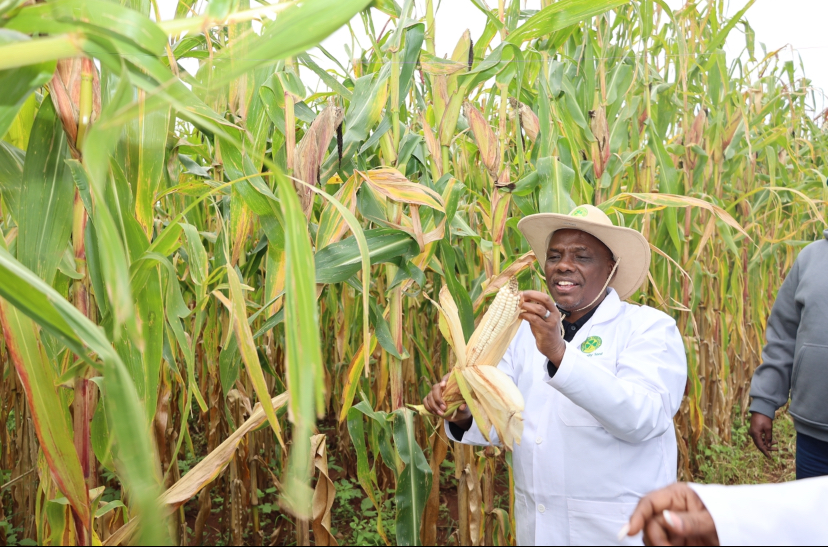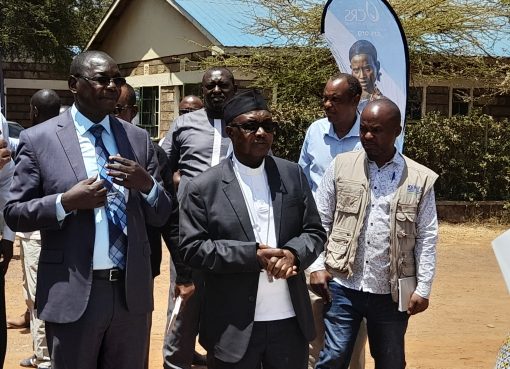Principal Secretary (PS) for State Department of Agriculture Dr. Kipronoh Ronoh has said the country is on track in addressing food and nutrition security through implementation of various Government interventions aligned to BETA plan and good weather conditions.
Dr. Ronoh said the fertilizer subsidy Programme has driven a 43% increase in maize production, with food insecure Kenyans declining from 1.9 million to 1 million people in 2024.
“In the past, we have faced challenges such as high input costs, climate change, prolonged droughts, floods and limited access to financial services, but have made significant strides,” said the PS at his Kilimo House office in Nairobi.
The country’s maize production has increased from 45 million 90Kg bags of maize in last year to 70 million 90Kg bags in 2024 attributed to the national fertilizer subsidy programme and good weather conditions.
“The increased availability of staple foods has led to lower maize prices of Kenyan shilling (KES) 3,200 per 90 kg bag and a significant reduction in flour prices from KES 250 in September 2022 to KES 120 in September 2024,” noted Dr. Ronoh.
PS Ronoh added that the ministry is focused on providing high-quality, affordable services to smallholder farmers, which is key to agricultural transformation.
“As a ministry, we are committed to promoting innovations and technologies in agriculture and livestock development in line with the Bottom-Up Economic Transformation Agenda (BETA), the Agricultural Sector Transformation and Growth Strategy (ASTGS), and Vision 2030,” added Dr. Ronoh.
“To enhance service delivery, a digital farmer registration platform to support access to subsidized inputs like fertilizers, with currently over 6.45 million farmers have been enrolled, up from 1.3 million in 2022,” he added.
He lauded the government’s efforts to operationalize the National Food Reserve at the National Cereals and Produce Board (NCPB), which aims to cushion the country against future food shortages and ensure affordable access to food for all Kenyans.
“Small-scale farmers in the country are set to reduce post-harvest losses by utilizing the new Warehouse Receipt System (WRS), which will allow them to store their produce in certified warehouses while awaiting favorable market prices and enhance food security by reducing post-harvest losses, which account for 40% of the food produced in the country,” PS added.
“We also appreciate the collaborations from our development agencies, Partners, Corporates, and non-governmental organizations in enhancing food security, which has resulted in improvements, with fewer than one million people affected in 2024,” he added.
Under the BETA plan, the Ministry has prioritized value chains such as Tea, edible oils, rice, cotton, coffee, beef, leather, and dairy.
On the Tea sector, the PS noted that Tea export volume grew by 16% in 2023, earning KES 180.57 billion and is expected to earn the country KES 200 billion this year.
Last week the smallholder tea farmers benefited from the Fertilizer Programme that has already started reaching the farmers through their factories countrywide.
The government also has rolled out edible oil promotion projects targeting to reduce imports by 50% by 2027.
He said part of the Coffee reforms seeks to enhance productivity targeting to increase productivity from 2kg/tree – 10kg/tree by 2027.
“Cotton acreage increased by over 8,500 acres, with support from county Governments, aiming to produce 100,000 bales by 2027,” he noted.
Dr. Ronoh added that the national government, in collaboration with county governments, is establishing commodity aggregation and industrial parks in each of the 47 counties.
“These centers will provide common user facilities for the storage and processing of our farm produce, enabling farmers to receive better prices for their goods while also reducing post-harvest losses,” added Dr. Ronoh.
By Ronald Cheruiyot





